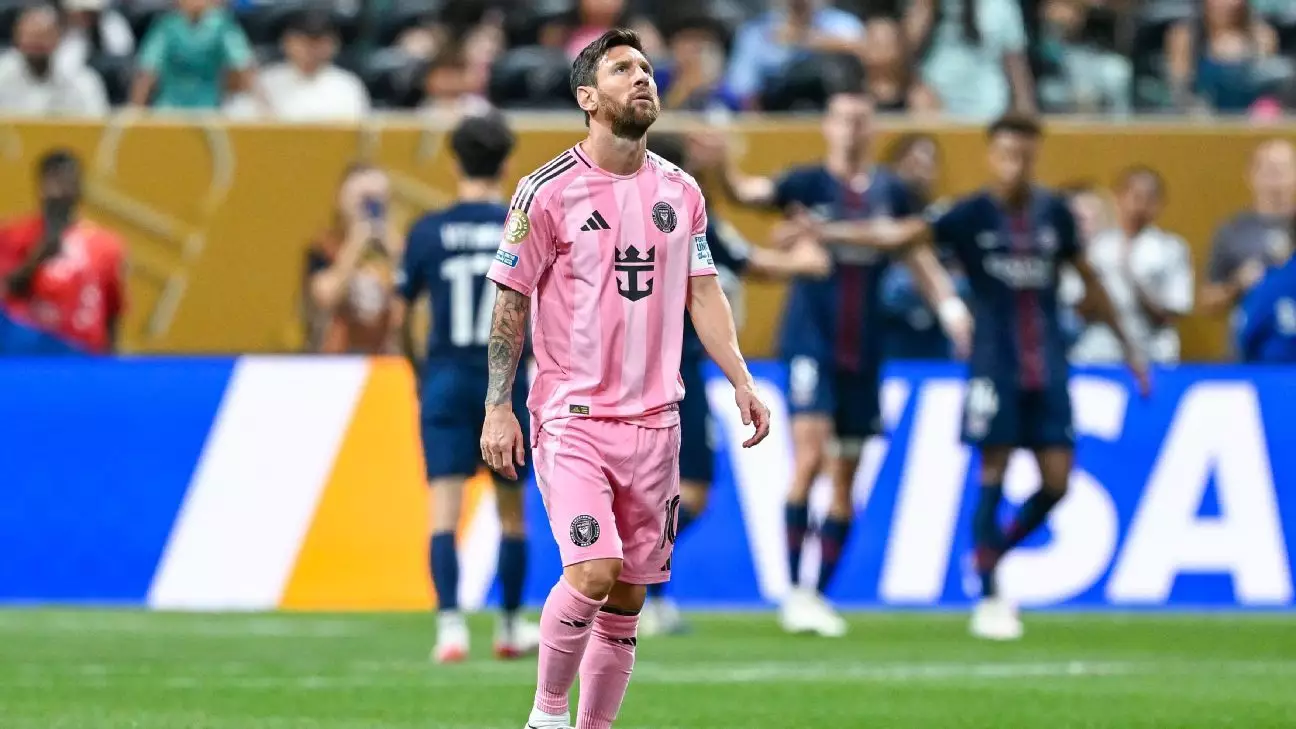Inter Miami’s 4-0 loss to Paris Saint-Germain at the Club World Cup was a predictable yet sobering display of the gulf between Major League Soccer’s developing clubs and the established powerhouses of European football. PSG, fresh off their latest Champions League triumph, epitomized footballing elegance and ruthless efficiency under the guidance of Luis Enrique. Their fluid ball movement, tactical discipline, and relentless intensity served as a potent reminder of the standards required on the world stage—levels still an aspiration for many MLS clubs.
From the outset, PSG dominated possession and territory, attacking with precision and pace. The first goal, a neat free-kick assist by Vitinha for João Neves, set the tone within the first ten minutes. PSG racked up 19 shots, with nine on target, revealing gaps in Miami’s defense and highlighting the visitors’ clinical edge. Contrastingly, Miami’s defense struggled to find cohesion, evidenced by an own goal from a relatively inexperienced substitute and difficulty responding to PSG’s emergent rhythm.
The MLS Roster Conundrum: Structural Challenges Exposed
The game exposed systemic issues inherent in MLS’s roster construction and salary rules. Inter Miami’s roster is a classic example of the “star-heavy, thin-depth” model common in the league. Stars like Lionel Messi, Luis Suárez, Jordi Alba, and Sergio Busquets provide undeniable quality, yet beyond this elite tier, depth is frail, largely due to MLS’s restrictive policies on transfers and roster flexibility.
This discrepancy was glaring as Miami coped with injuries and fatigue, forcing coaches to rely on young, untested talents thrust onto a global stage far beyond domestic competition. The likes of Benjamin Cremaschi and Noah Allen, local academy products, lacked the experience and support necessary to withstand PSG’s relentless pressure. Coaches Gerardo Martino and Javier Mascherano have openly criticized MLS’s rules, which arguably handicap clubs’ ability to build robust, competitive squads capable of sustaining performance against international heavyweights.
Messi: Magic Constrained by Context
Lionel Messi can create moments of brilliance that transcend the overall team’s weaknesses—but against PSG, even Messi’s genius wasn’t enough to stem the tide. While he inspired Miami’s historic win over Porto earlier in the tournament, his effect was blunted when isolated from a supporting cast of equal caliber. This underlines a crucial truth: football remains a team sport. Individual brilliance can win single matches but not tournaments, especially against seasoned teams conditioned to execute collective strategies at the highest level.
Miami’s inability to surround Messi with a strong supporting cast is both a cautionary lesson and a rallying point. To rise on the global stage, MLS clubs must rethink construction beyond marquee signings—investing heavily in player development, scouting, and tactical sophistication.
The Bright Spots amid the Defeat
Despite the humiliating scoreline, Inter Miami’s journey to the Club World Cup knockout rounds is a breakthrough in itself. The club reached this milestone by smashing the MLS Supporters’ Shield record, demonstrating consistent dominance domestically. Their ability to draw with formidable sides like Al Ahly and Palmeiras, and shock Porto with a spirited victory, reveals a team in ascendancy.
Moreover, Miami’s reliance on youthful products rising through their academy is encouraging. The exposure gained by players like Cremaschi, Allen, and Ian Fray against some of the world’s best teams is invaluable. It’s an experience that accelerates development in ways few domestic matches can offer. With stars like Alba championing this blend of youth and experience, Miami is laying groundwork for sustained growth.
Looking Beyond the Scoreline: A Blueprint for Growth
The defeat to PSG symbolizes more than just a bad result; it flags the gap between MLS’s vision and the realities of global soccer economics and performance. Miami’s owners and management have openly acknowledged the need for greater roster flexibility and investment in depth. This self-awareness is essential for evolution. If MLS aims to compete internationally, reforming league policies to enable squads with broader quality beyond their stars is critical.
Additionally, Miami’s experience highlights that growth is not linear. Being “the best MLS team” is not sufficient—you must prepare for and adapt to far stronger opposition beyond this bubble. Lessons around fitness, tactical discipline, substitution impact, and mental resilience were starkly visible. These are the areas where Miami—and MLS as a whole—must upskill rapidly.
A New Perspective on the Global Stage
Inter Miami’s Club World Cup campaign isn’t a story of failure; it’s a narrative of awakening. While PSG showed what it means to be elite in performance and professionalism, Miami demonstrated potential that can be harnessed. The tournament exposed flaws but also highlighted the impact of savvy recruitment and star power in raising the profile of North American soccer.
In an era where MLS is aggressively expanding and investing, Miami’s journey will serve as both a benchmark and a challenge for others. With the proper structural adjustments and strategic vision, the next time Miami—or another MLS club—faces Europe’s giants, they may not just compete but truly challenge.

